初中英语语法专题精讲及答案
- 格式:doc
- 大小:163.00 KB
- 文档页数:11
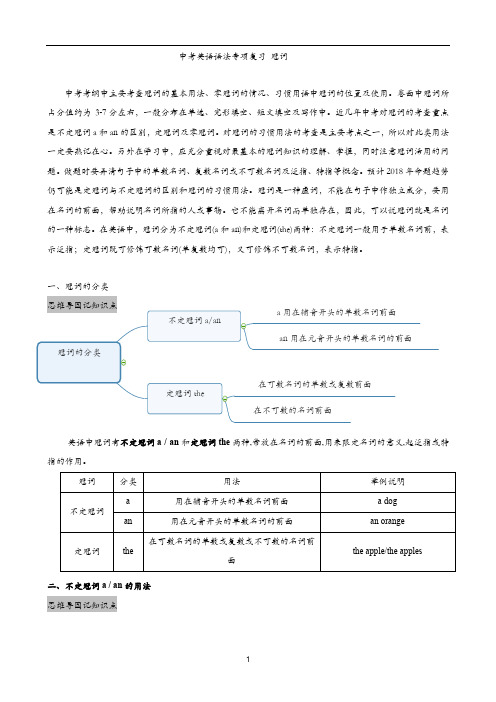
中考英语语法专项复习冠词中考考纲中主要考查冠词的基本用法、零冠词的情况、习惯用语中冠词的位置及使用。
卷面中冠词所占分值约为3-7分左右,一般分布在单选、完形填空、短文填空及写作中。
近几年中考对冠词的考查重点是不定冠词a和an的区别,定冠词及零冠词。
对冠词的习惯用法的考查是主要考点之一,所以对此类用法一定要熟记在心。
另外在学习中,应充分重视对最基本的冠词知识的理解、掌握,同时注意冠词活用的问题。
做题时要弄清句子中的单数名词、复数名词或不可数名词及泛指、特指等概念。
预计2018年命题趋势仍可能是定冠词与不定冠词的区别和冠词的习惯用法。
冠词是一种虚词,不能在句子中作独立成分,要用在名词的前面,帮助说明名词所指的人或事物。
它不能离开名词而单独存在,因此,可以说冠词就是名词的一种标志。
在英语中,冠词分为不定冠词(a和an)和定冠词(the)两种:不定冠词一般用于单数名词前,表示泛指;定冠词既可修饰可数名词(单复数均可),又可修饰不可数名词,表示特指。
一、冠词的分类英语中冠词有不定冠词a / an和定冠词the两种,常放在名词的前面,用来限定名词的意义,起泛指或特指的作用。
二、不定冠词a / an的用法思维导图记知识点不定冠词a / an用在单数名词的前面,a用在辅音开头的词前面; an用在元音开头的词的前面。
①表示某一个人或东西,但不具体说明何人或何物。
如:There is a dog lying on the ground.(有一只狗躺在地上。
)②表示某类人或事物,以区别于其他种类。
如:A elephant is much stronger than a man.(大象比人强壮多了。
)(不能译为:一头大象比一个人强壮。
)③表示某类人或事物中的任何一个。
如:He is a teacher of English.(他是英语教师。
)④表示“一”这个数量。
如:There is a table and four chairs in that dining-room.(在那个餐厅里有一张桌子和四把椅子。
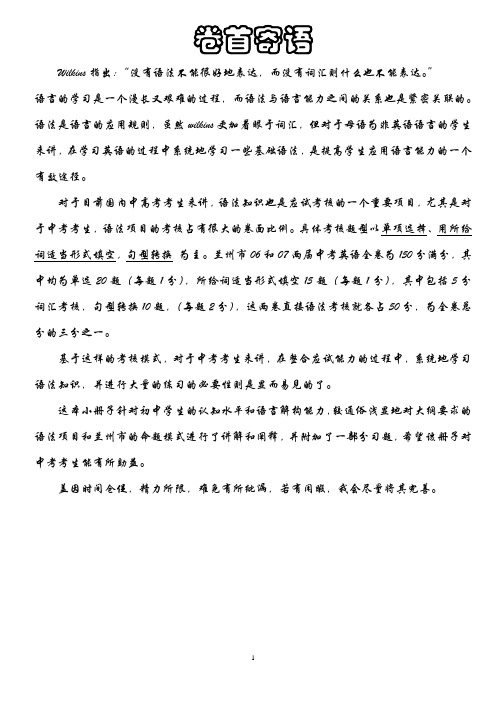
卷首寄语Wilkins指出:“没有语法不能很好地表达,而没有词汇则什么也不能表达。
”语言的学习是一个漫长又艰难的过程,而语法与语言能力之间的关系也是紧密关联的。
语法是语言的应用规则,虽然wilkins更加着眼于词汇,但对于母语为非英语语言的学生来讲,在学习英语的过程中系统地学习一些基础语法,是提高学生应用语言能力的一个有效途径。
对于目前国内中高考考生来讲,语法知识也是应试考核的一个重要项目,尤其是对于中考考生,语法项目的考核占有很大的卷面比例。
具体考核题型以单项选择、用所给词适当形式填空,句型转换为主。
兰州市06和07两届中考英语全卷为150分满分,其中均为单选20题(每题1分),所给词适当形式填空15题(每题1分),其中包括5分词汇考核,句型转换10题,(每题2分),这两卷直接语法考核就各占50分,为全卷总分的三分之一。
基于这样的考核模式,对于中考考生来讲,在整合应试能力的过程中,系统地学习语法知识,并进行大量的练习的必要性则是显而易见的了。
这本小册子针对初中学生的认知水平和语言解构能力,较通俗浅显地对大纲要求的语法项目和兰州市的命题模式进行了讲解和阐释,并附加了一部分习题,希望该册子对中考考生能有所助益。
盖因时间仓促,精力所限,难免有所纰漏,若有闲暇,我会尽量将其完善。
Contents第一部分语法讲解第一讲词类、句子成分、构词法 (3)第二讲名词 (4)第三讲代词 (6)第四讲数词 (9)第五讲冠词 (10)第六讲形容词和副词 (12)第七讲介词 (19)第八讲动词(一)动词概述 (21)第九讲动词(二)动词时态和语态 (25)第十讲动词(三)非谓语动词及动词辨析 (29)第十一讲连词 (35)第十二讲简单句 (36)第十三讲句子成分 (39)第十四讲简单句句式 (42)第十五讲并列句和主从复合句 (43)第二部分巩固与提高测评测评一名词 (47)测评二代词 (48)测评三数词 (51)测评四冠词 (52)测评五形容词和副词 (54)测评六介词 (58)测评七动词 (60)测评八连词 (69)测评九句子 (70)测评十交际用语 (75)第三部分语法网络图第一讲:词类、句子成分和构词法:1、词类:英语词类分十种:名词、形容词、代词、数词、冠词、动词、副词、介词、连词、感叹词。

初中英语语法知识点精讲+习题+练习(精华版)(注:共四部分)第一部分1) leave的用法1.“leave+地点”表示“离开某地”。
例如:When did you leave Shanghai?你什么时候离开上海的?2.“leave for+地点”表示“动身去某地”。
例如:Next Friday, Alice is leaving for London.下周五,爱丽斯要去伦敦了。
3.“leave+地点+for+地点”表示“离开某地去某地”。
例如:Why are you leaving Shanghai for Beijing?你为什么要离开上海去北京?2) 情态动词should“应该”学会使用should作为情态动词用,常常表示意外、惊奇、不能理解等,有“竟会”的意思,例如:How should I know? 我怎么知道?Why should you be so late today? 你今天为什么来得这么晚?should有时表示应当做或发生的事,例如:We should help each other.我们应当互相帮助。
我们在使用时要注意以下几点:1. 用于表示“应该”或“不应该”的概念。
此时常指长辈教导或责备晚辈。
例如:You should be here with clean hands. 你应该把手洗干净了再来。
2. 用于提出意见劝导别人。
例如:You should go to the doctor if you feel ill. 如果你感觉不舒服,你最好去看医生。
3.用于表示可能性。
should的这一用法是考试中常常出现的考点之一。
例如:We should arrive by supper time. 我们在晚饭前就能到了。
She should be here any moment. 她随时都可能来。
3) What...? 与Which...?1. what 与which 都是疑问代词,都可以指人或事物,但是what仅用来询问职业。
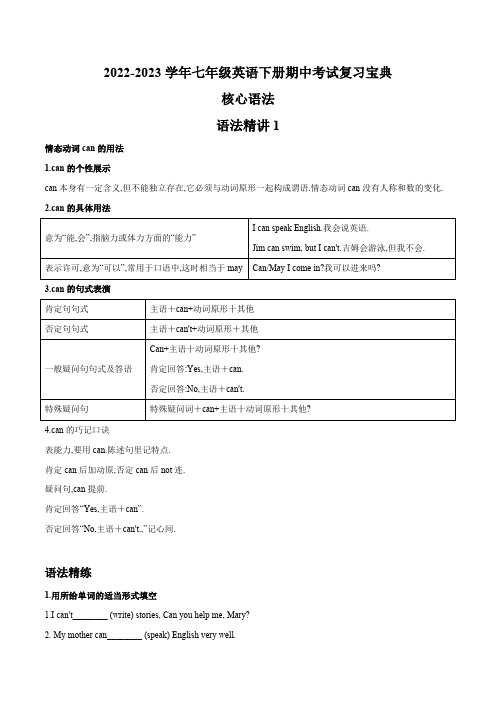
2022-2023学年七年级英语下册期中考试复习宝典核心语法语法精讲1情态动词can的用法1.can的个性展示can本身有一定含义,但不能独立存在,它必须与动词原形一起构成谓语.情态动词can没有人称和数的变化.2.can的具体用法意为“能,会”,指脑力或体力方面的“能力”I can speak English.我会说英语.Jim can swim, but I can't.吉姆会游泳,但我不会.表示许可,意为“可以”,常用于口语中,这时相当于may Can/May I come in?我可以进来吗?3.can的句式表演肯定句句式主语+can+动词原形十其他否定句句式主语+can't+动词原形+其他一般疑问句句式及答语Can+主语十动词原形十其他?肯定回答:Yes,主语+can.否定回答:No,主语+can't.特殊疑问句特殊疑问词+can+主语十动词原形十其他?4.can的巧记口诀表能力,要用can.陈述句里记特点.肯定can后加动原,否定can后not连.疑问句,can提前.肯定回答“Yes,主语+can”.否定回答“No,主语+can't.,”记心间.语法精练1.用所给单词的适当形式填空1.I can't________ (write) stories, Can you help me, Mary?2. My mother can________ (speak) English very well.3.What can your brother________ (do)?4.Miss Lin can't play the piano, but she can________ (sing)well.5.Little Tom can draw, but he________ (can not) dance.答案:1.1.write2.speak3.do4.sing5.can'tII.单项选择1.(2022·百色中考)- ________ you tell us a story in English?-I think I can do it. Let me try.A. NeedB. CanC. ShouldD. Must2.(2022·北京中考)- ________ I take photos here?-Sorry, you can't. It's not allowed in the museum.A. MustB. NeedC. CanD. Will3.We should learn some basic life skills since we________ depend on our parents some day.A. canB. can'tC. mustD. mustn't4. -What kind of music do you like?-I like music that I________ dance to.A. canB. mustC. shouldD. need5.(2022·成都中考)-There is a new art museum in our city. You________ miss it.-Thank you. I won't.A. can'tB. mustC. needn't答案:1.B 考查情态动词辨析.句意:-你能用英语给我们讲一个故事吗?-我认为我能.让我试试.need需要;can能; should应当;must必须.故选B.2.C 考查情态动词辨析.句意:-我能在这里拍照吗?-抱歉,你不能.博物馆不允许拍照.must必须;need需要;can能;will将.故选C.3.B 考查情态动词辨析.句意:既然我们有一天不能依靠父母,我们就应当学会一些基本的生活技能.can 能;can't不能;must必须;mustn't不应该.故选B.4.A 考查情态动词辨析.句意:-你喜欢哪种音乐?-我喜欢能伴着跳舞的音乐.can能;must 必须;should应当;need需要.故选A.5.A 考查情态动词辨析.句意:-我们城市有一个新的艺术博物馆.你不能错过它.-谢谢.我不会的.can't 不能;must 必须;needn't 不必.故选A.III.按要求改写句子(每空一词)1.My father can speak English well.(改为一般疑问句)________ your father________ English well?2.Tom can ride a horse.(改为否定句)Tom________ ________ a horse.3.Mr.Green can do Chinese kung fu.(对画线部分提问)________ ________ Mr. Green________?4.Can Tom and Jim draw pictures?(作肯定回答)Yes, ________ ________.5.play,can,Cindy,well,the,guitar(连词成句)___________________________________________________________________________________________?答案:1.Can;speak2. can't ride3.What can; do4.they can5.Can Cindy play the guitar well语法精讲2一、频度副词定义用来表示频率的副词,叫频度副词.常见的频度副词有:always, usually, often, sometimes, never 等通常在be 动词、助动词或情态动词之后He is always busy.他总是很忙.I will never forget you.我永远也不会忘记你.通常位于实义动词之前They often go swimming.他们经常去游泳.频度副词在句中的位置sometimes 可放在句首、句中或句尾Sometimes she watches TV.她有时看电视.提问how often 意为“多久一次”-How often do you drink milk?-你多久喝一次牛奶?-Every day.-每天.二、一般现在时定义表达现在的状态,主语的性格、能力以及经常或习惯性的动作等He usually takes the bus to school.主语是第三人称单数时,谓语动词用第三人称单数形式他通常乘坐公交车去上学.动词形They watch TV every day.态变化主语不是第三人称单数,谓语动词用原形他们每天都看电视.三、句式结构肯定句句式主语+be/行为动词+其他主语+be+ not+其他否定句句式主语+don't/doesn't+动词原形+其他句式结构Be+主语+其他?一般疑问句句式Do/Does+主语十动词原形十其他?语法精练1.用所给单词的适当形式填空1.Mary usually________ (go) shopping with her mother on Sunday.2. ________ (do)Peter________ (take)a shower in the evening or in the morning?3.Lisa________ (not do) her homework in the evening.4.She never________ (eat) hamburgers for lunch.5.-What time Jack________ (go) to bed?-At 10:30 p.m.答案:1.goes2.Does;take3.doesn't do4.eats5.does;goII.按要求改写句子(每空一词)1.Mr. Green usually goes to work at seven o'clock.(改为一般疑问句)________ Mr. Green usually________ to work at seven o'clock?2.Anna always plays volleyball after school.(改为否定句)Anna________ plays volleyball after school.3.I do my homework at home on weekends.(改为否定句)I________ ________ my homework at home on weekends.4.Lisa sometimes eats bread for breakfast.(对画线部分提问)________ ________ ________ Lisa________ bread for breakfast?5.They usually exercise in the morning.(用he改写句子)________ usually________ in the morning.答案:1.Does;go2.never3.don't do4.How often does; eat5.He;exercises语法精讲3一、how引导的特殊疑问句1.直接由how引导的特殊疑问句询问交通方式How does she get to school?她是如何到校的?询问身体状况How are your parents?你父母身体好吗?询问天气状况How is the weather today?今天天气怎么样?询问程度How do you like the TV show?你觉得这个电视节目怎么样?2.由“how+形容词/副词”引导的特殊疑问句how long意为“多长”,询问时间或物体的长度how far意为“多远”,询问距离how often意为“多久一次”,询问频率how old意为“多大”,询问年龄how many意为“多少”,询问可数名词的数量意为“多少”,询问不可数名词的数量how much意为“多少钱”,询问价格二、交通方式的表达1.take a/the+交通工具take a/the subway/bus/train/boat乘地铁/公共汽车/火车/船动词(短语)2.其他表达方式walk 步行ride a/the/one's bike 骑自行车drive a car 开车1.by+交通工具by bike骑自行车by car/bus/train/subway/boat乘车/公共汽车/火车/地铁/船2.in/on+限定词十交通工具介词(短语)on the bus 乘公共汽车in a car 乘车3.固定表达方式on foot 步行语法精练I.根据句意填写疑问词(组),完成句子1.- _________ does Linda get to school?-She takes the bus.2.- _________ _________ does it take you to get home from work?-About twenty minutes.3.- _________ _________ is it from here?-One hundred kilometers.4.-I walk to school. _________ about you, Jane?-I ride my bike.5.- _________ _________ people are there in the photo?-Six.答案:1.How2.How long3.How far4.How5.How manyII.单项选择1.(2022·安徽滁州凤阳博文国际学校期末) I usually_________ to the bus stop, and then go to school by bus.A. by bikeB. on my bikeC. in my bikeD. ride my bike2.- _________ does Bob usually go to work?-He usually rides his bike.A. WhatB. HowC. WhereD. Who3.(2022·浙江杭州萧山城区期中)-Excuse me. _________ is it to the East Station?-About half an hour by taxi.A. How manyB. How longC. How farD. How old4.- _________ do you visit Uncle Tom?-Once a week.A. How longB. How oftenC. How soon答案:1.D 考查动词短语的用法.句意:我通常骑自行车到公交站,然后坐公交上学.I后面需要一个动词短语.故选D.2.B 考查疑问词辨析.由答语“他通常骑自行车”可知,问句是询问上班的交通方式.故选B.3.C 考查疑问词组辨析.句意:-打扰一下.到东站有多远?--坐出租车大约半个小时.how many多少;how long 多久;how far多远;how old几岁.故选C.4.B 考查特殊疑问词组辨析.由答语“每周一次”可知,问句是询问“你多久拜访一次汤姆叔叔”.提问频率用how often.故选B.语法精讲4一、祈使句1.祈使句的定义表示请求、命令、建议、警告、劝说等的句子叫祈使句.在祈使句中,肯定句一般以动词原形开头,通常省略主语you;否定句在动词原形前加don't.2.祈使句的句式结构祈使句句式肯定句句式否定句句式P型:Please十动词原形十其他Please stand up.Please don't stand up.V型:动词原形十其他Look at the blackboard.Don't look at the blackboard.L型:Let+宾语十动词原形+其他Let her go.Don't let her go./ Let her not go.B型:Be+表语Be careful.Don't be late for class!N型:No+名词/动名词/No photos! No parking!3.祈使句用法口诀祈使句,祈使句,请求、命令或建议.主语是you常省去,动词原形开头记.否定形式要注意,句首要把don't加.要讲客气用please,句首、句末没关系.二、must和have to辨析1.两者均意为“必须”.must更强调说话者的主观意愿,have to强调客观需要,意为“不得不”.2.must一般只表示现在,没有人称和数的变化;而have to则可以用于不同的时态,有人称和数的变化.3.两者的否定式含义大不相同.mustn't 意为“不准;禁止”,而don't have to意为“不必”.【注意】以must开头的一般疑问句,其肯定回答用must;否定回答用needn't或don't have to.语法精练1.用所给单词的适当形式填空1. _________ (finish)your homework first.2. _________ (not come) to the zoo before 6 o'clock, please.3.Please_________ (be) quiet in the room.4.No_________ (swim) in the river!5.They have to_________ (do) their homework when they get home.答案:1.Finish2.Don't come3.be4.swimming5.doII.单项选择1.(2022·广西河池凤山期末) _________ play the guitar here, Jack. It's too noisy.A. Can'tB. NoC. Don'tD. Doesn't2.(2022·湖南郴州期末)-Jack, _________ leave the dirty dishes in the kitchen!-Sorry, Mom.A. can'tB. doesn'tC. don't3.(2022·湖南株洲攸县期末) _________ run in the hallway, children!A. Don'tB. NotC. Can't4.(2022·江西宜春期末)-Can I go out with Lisa, Dad?-Yes, but you_________ come back home before five o'clock, You'll have an art lesson then.A. mustB. canC. mustn'tD. can't5.(2022·浙江宁波海曙区期中)We_________ be noisy in the library and we_________ keep the books clean.A. have to; mustB. must; can'tC. have to; can'tD. can't; have to答案:1.C 考查祈使句.句意:不要在这里弹吉他,杰克.太吵了.祈使句的否定句是“Don't+动词原形”.故选C.2.C 考查祈使句.句意:-Jack,不要把脏餐具留在厨房里.-抱歉,妈妈.祈使句的否定句是“Don't+动词原形”.故选C.3.A 考查祈使句.句意:孩子们,不要在走廊里跑!祈使句的否定句是“Don't+动词原形”.故选A.4.A 考查情态动词辨析.句意:-爸爸,我可以和丽莎出去吗?--是的,但你必须在五点钟之前回家.那时你要上一节艺术课.故选A.5.D 考查情态动词辨析.句意:我们不能在图书馆里吵闹,我们必须保持干净.can't不能;have to不得不.故选D.语法精讲5一、形容词形容词修饰名词,用以说明事物或人的性质和特征.它通常在句子中作定语、表语或宾语补足语等.句中成分说明示例定语一般修饰名词,置于名词之前She is a happy girl.她是一个幸福的女孩.置于系动词(be, look, feel, sound等)之The girl is beautiful.这个女孩很漂亮.表语后,可以被程度副词very, too等修饰宾语补足语说明宾语的状态、特征等What makes you so happy?什么使你这么开心?二、特殊疑问句1.定义及答语特殊疑问词引导的疑问句叫特殊疑问句,其结构为“特殊疑问词十一般疑问句?”回答特殊疑问句不能用yes或no.回答时要针对具体情况来作出回答.2.特殊疑问词特殊疑问词分为两类:疑问代词和疑问副词,其用法归纳如下:Who意为“谁”,用于对主语(人称代词)进行提问Whom意为“谁”,用于对宾语(人称代词)进行提问When意为“何时”,用于对时间进行提问Where意为“哪里”,用于对具体地点进行提问How意为“怎样”,用于对方式进行提问Why意为“为什么”,用于对原因进行提问What意为“什么”,用于对某人的名字、职业等进行提问Which用于对“哪个;哪些”进行提问【注意】由why引导的特殊疑问句,一般要用because引导的从句来回答.because是连词,作“因为”讲,其后要接一个句子来陈述理由.例如:-Why does she do that?-她为什么要那样做?-Because she wants to help the person.-因为她想帮助那个人.语法精练I.单项选择1.(2022·江西赣州兴国期末)-Don't be_________. Jack! Help me clean the room right now!-OK, Mom.A. afraidB. lazyC. shyD. quiet2.(北京海淀区期中) _________ is Jenny from?-She comes from the US.A. WhatB. WhoC. WhenD. Where3.(2022·广西北海期末)- _________ do you like this book?-Because it's exciting.A. WhyB. WhatC. HowD. Who4.(2022·福建莆田期末)My brother is very_________. He can always make new things.A. smartB.busyC. kind5.- _________ was the car invented?-It was invented in 1885.A. WhenB. WhichC. WhoD. Where答案:1.B 考查形容词辨析.句意:-不要懒惰,杰克!立即帮助我清扫房间!-好的,妈妈.afraid害怕的;lazy懒惰的; shy害羞的;quiet安静的.故选B.2.D 考查特殊疑问词辨析.由答语“她来自美国”可知,问句是询问珍妮来自什么地方.对地方提问需用where.故选D.3.A 考查疑问词辨析.句意:-你为什么喜欢这本书?-因为它是令人兴奋的.why为什么;what什么;how怎样;who谁.故选A.4.A 考查形容词辨析.句意:我弟弟很聪明.他总是能制作新东西.smart聪明的;busy忙碌的;kind和蔼的.故选A.5.A 考查特殊疑问词辨析.由答语中的“在1885年”可知,问句是询问“汽车是什么时候被发明的”.对时间提问用when.故选A.II.对画线部分提问(每空一词)1.Linda doesn't like math because it's difficult._________ _________ Linda_________ math?2.I can see some books on the table._________ can you_________ on the table?3.Mr. Green often goes to work at 7:30 in the morning._________ _________ Mr. Green often go to work?4.Lions are from South Africa._________ _________ lions from?5.Most students go to school by bus._________ _________ most students go to school?答案:1.Why doesn't; like2.What;see3.When does4.Where are5.How do。

卷首寄语Wilkins指出:“没有语法不能很好地表达,而没有词汇则什么也不能表达。
”语言的学习是一个漫长又艰难的过程,而语法与语言能力之间的关系也是紧密关联的。
语法是语言的应用规则,虽然wilkins更加着眼于词汇,但对于母语为非英语语言的学生来讲,在学习英语的过程中系统地学习一些基础语法,是提高学生应用语言能力的一个有效途径。
对于目前国内中高考考生来讲,语法知识也是应试考核的一个重要项目,尤其是对于中考考生,语法项目的考核占有很大的卷面比例。
具体考核题型以单项选择、用所给词适当形式填空,句型转换为主。
兰州市06和07两届中考英语全卷为150分满分,其中均为单选20题(每题1分),所给词适当形式填空15题(每题1分),其中包括5分词汇考核,句型转换10题,(每题2分),这两卷直接语法考核就各占50分,为全卷总分的三分之一。
基于这样的考核模式,对于中考考生来讲,在整合应试能力的过程中,系统地学习语法知识,并进行大量的练习的必要性则是显而易见的了。
这本小册子针对初中学生的认知水平和语言解构能力,较通俗浅显地对大纲要求的语法项目和兰州市的命题模式进行了讲解和阐释,并附加了一部分习题,希望该册子对中考考生能有所助益。
盖因时间仓促,精力所限,难免有所纰漏,若有闲暇,我会尽量将其完善。
Contents第一部分语法讲解第一讲词类、句子成分、构词法 (3)第二讲名词 (4)第三讲代词 (6)第四讲数词 (9)第五讲冠词 (10)第六讲形容词和副词 (12)第七讲介词 (19)第八讲动词(一)动词概述 (21)第九讲动词(二)动词时态和语态 (25)第十讲动词(三)非谓语动词及动词辨析 (29)第十一讲连词 (35)第十二讲简单句 (36)第十三讲句子成分 (39)第十四讲简单句句式 (42)第十五讲并列句和主从复合句 (43)第二部分巩固与提高测评测评一名词 (47)测评二代词 (48)测评三数词 (51)测评四冠词 (52)测评五形容词和副词 (54)测评六介词 (58)测评七动词 (60)测评八连词 (69)测评九句子 (70)测评十交际用语 (75)第三部分语法网络图第一讲:词类、句子成分和构词法:1、词类:英语词类分十种:名词、形容词、代词、数词、冠词、动词、副词、介词、连词、感叹词。

反义疑问句【反义疑问句】(一)概念:反意疑问句是由陈述句和附在其后的附加疑问句组成。
其中附加疑问句是对陈述句所说的事实或观点提出疑问,起证实作用,一般用于证实说话者所说的事实或观点。
(二)基本用法要点注意:1、反意疑问句前后两部分谓语应是:“肯定陈述+否定疑问”或“否定陈述+肯定疑问”。
2、简略问句如果是否定式:not应与be,do,will等系动词、助动词、情态动词缩写。
3、简略问句的主语不用名词,应用人称代词。
4、陈述部分含“too...to”时,是否定句。
(三)特殊用法:1) 陈述部分是"there be"结构的,疑问部分用there。
There is something wrong with your watch, isn't there?There will not be any trouble, will there?2)must be 表示“推测”时,疑问部分用isn’t/aren’t+主语(人称代词),不可用“mustn’t”: The bag must be yours, isn’t it?You must be hungry, aren’t you?must 表示“必须”时,疑问部分用needn’t:I must finish my homework today, needn’t I?Mustn’t表示“禁止”时,疑问部分用must.You mustn’t play football in the street, must you?3) a.陈述部分有have/has/had to +v.表“不得不”时,疑问部分常用don't/doesn’t/didn’t +主语。
We have to get there at eight tomorrow, don't we?b.陈述部分have “有”时,疑问句尾可用have,也可用do:She has a new pen, hasn’t/doesn’t she?c. Have表示“吃,喝,玩,度过”等时,疑问句尾用do.They had noodles for lunch, didn’t they?d. Had better 用在陈述部分时,疑问部分用had.You had better finish your homework on time, hadn’t you?e. Have用在完成时中,疑问部分动词用have:She has gone to Beijing with her mother, hasn’t she?4) 陈述部分I am时,疑问部分要用aren't I.I'm as tall as your sister,aren't I?(我和你姐姐一样高,对吗?)5) 陈述部分用no, nothing, nobody, never, few, little, seldom, hardly等否定含义的词时,疑问部分用肯定含义。

初二语法精讲精练习题答案名词基础题:1-5 CBDCD 6-10 BADBA提高题:1-5 BAAAD 6-10 CCBDA 11-15 CDAAC 16-18 CAA综合填空1. vegetables 2. noise 3. policemen 4. mother’s 5. much数词基础题:1-5 BABCD 6-10 BCBCB提高题:1-5 DCABC 6-10 BACDD冠词区别词组:at table 在进餐 at the table 在桌子旁边at desk 在读书 at the desk 在课桌旁at school 在上学 at the school 在学校里by sea乘船by the sea在海边go to sea出海go to the sea去海边go to school 去上学 go to the school(因事)去学校go to bed 上床睡觉 go to the bed 在床上go to hospital 去看病 go to the hospital 去医院in class 在上课 in the class 在班级里面in bed 卧床 in the bed 在床上in prison 坐牢 in the prison(因事)在监狱in hospital 住院 in the hospital(因事)在医院in place of 代替 in the place of 在...的地方in case of 万 in the case of 就...来说in future从今以后,将来in the future未来next year明年the next year 第二年on earth究竟on the earth在地球上,在世上take place 发生 take the place 代替in front of在…(外部的)前面in the front of在…(内部的)前面out of question 毫无疑问 out of the question 完全不可能two of us我们当中的两人/the two of us我们两人(共计两人)a teacher and writer一位教师兼作家a teacher and a writer一位教师和一位作家基础题:1-5 C DADDB 6-10 BBCAD提高题:1-5 ACCCB 6-10 CCCDA根据需要在短文空格中填入适当的冠词On a fine morning in May, my classmates and I went to visit a university. It is one of the biggest universities in our city. We saw the students of the university were studying. We talked with an old professor .He told us a lot about his university. At half past ten we said goodbye to the professor of the university and came back to / school. We had a good time that day because we learned a lot from the visit.参考答案:一、单项选择1、基础题:BBAAD CACDB CC2、提高题:ABAAA BACB二、句型转换:把直接引语改为间接引语1、基础题1. asked, to open the window2. how much the pencil-box was3. where I was born4. my classmates would visit Miss Wang that Sunday5. what your sister prefers6. light travels much faster than sound7. if Jim studies hard at school8. which is the way to the Tim Mall9. if my father was a reprter10. told, not to be late next time2. 提高题1.who the little girl in red is2. asked, to take good care of her dog when she was away.3. told me not to smoke any more4. asked, if he could open, for him5. what time he got up this/ that morning6. asked, to come early the next time7. if she could come here / go there at once8. if there is a picture of the boy in the newspaper参考答案A组题1-5 ACBAC 6-10 AAAAD 11-15 DBABA 16-20 AABAB 21-25 BDDAB B组题1-5 AADAA 6-10 CDDAC 11-15 AABAA 16-20 AAADA 21-25 DDDCA 句型转换1. was used to make2. must be thrown away3. must be handed in4. should be watered by us5. aren’t let to6. has the book been kept by you7. was given a present by her; was given to me by her8. was made a birthday cake by them; was made for their mother by then9. Must all the exercises be done by me10. was let to help, by his mother11. was your finger cut yesterday12. is, heard to sing参考答案:第一部分:知识点分析介绍部分:18.A 19.A难点、易错点:例题1、D 2、C 3、A 4、B 5、D第二部分:强化练习一、单项选择1、基础题1.A2.B3.B4.B5.C6.C7.B8.B9.A 10.C2、提高题1.A2.A3.A4.C5.D6.D7.D8.A9.C 10.C11.D 12.B 13.D 14.B 15.D 16.D 17.C 18.D 19.C 20.A参考答案一、名词、冠词1.C 2.A 3.B 4.B 5.B二、代词、数词1.A 2.D 3.D 4.C 5.D 6.A三、介词1、B 2.C 3.B 4.B 5.D 6.C 7.D 8.A 9.B 10.C四、连词 1.A 2.C 3.C 4.B 5.C 6.A五、形容词 1.D 2.C 3.B 4.D 5.A 6.D 7.A 8.B六、副词 1.A 2.D 3.D 4.D 5.D 6.B 7.C 8.C 9.A七、动词综合 1.B 2.B 3.A 4.C 5.A 6.B 7.C 8.B 9.C 10.B八、句子1.C 2.C 3.C 4.D 5.A九、不定式1.A 2.D 3.C 4.C 5.A 6.A 7.A十、情态动词1.C 2.A 3.D 4.C 5.D 6.B 7.A。

初中英语语法-15个专题汇总(带习题和答案)目录专题一名词 (2)专题二数词、冠词 (9)专题三介词、连词 (15)专题四代词 (22)专题五形容词、副词 (31)专题六动词的分类 (39)专题七情态动词、系动词 (46)专题八动词时态 (53)专题九被动语态 (60)专题十非谓语动词 (66)专题十一简单句、并列句 (76)专题十二祈使句、感叹句 (84)专题一三宾语从句 (91)专题一四定语从句 (99)专题一五状语从句 (106)专题一名词1.名词的数1.概述: 名词按其表示的事物的性质分为可数名词和不可数名词。
2.可数名词及其单复数:可数名词有单复数变化,其前通常用不定冠词和数词来修饰,还可用many, few, a few, some, any, plenty of, lots of, a number of 等修饰。
构成名词复数形式的方法分为规则法和不规则法两种。
1)复数的规则构成法:绝大多数英语中的名词复数都是在单数名词后加上词尾-s或-es构成的。
具体规则如下图:a.单复同形的:Chinese-Chinese, Japanese-Japanese, deer-deer, sheep-sheep,fish-fish(表示鱼的数量)b. 熟记下列词的复数变化:man-men, woman-women, policeman-policemen, foot-feet, tooth-teeth, mouse-mice, child-childrenc. 以man, woman做定语构成的复合名词,变复数时要全变:a man teacher-two men teachers; 其他情况一般只变主体名词而作定语的名词不变:a girl student-two girl students3. 不可数名词:不可数名词没有单复数。
如:water, meat, air等。
在表示数量时,通常用以下方法。
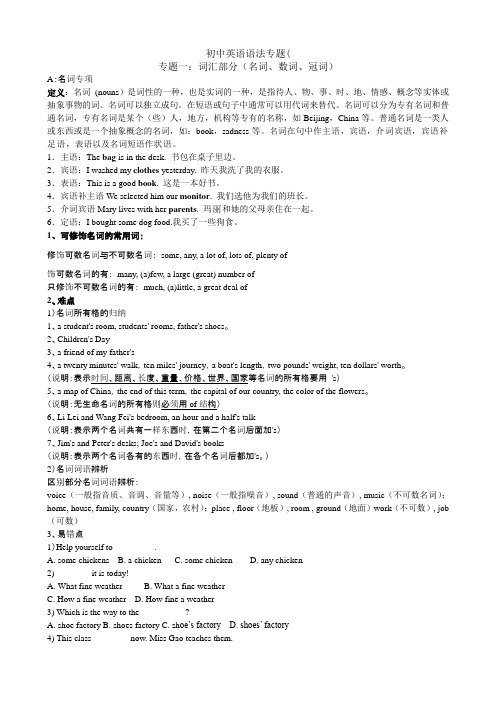
初中英语语法专题(专题一:词汇部分(名词、数词、冠词)A:名词专项定义:名词(nouns)是词性的一种,也是实词的一种,是指待人、物、事、时、地、情感、概念等实体或抽象事物的词。
名词可以独立成句。
在短语或句子中通常可以用代词来替代。
名词可以分为专有名词和普通名词,专有名词是某个(些)人,地方,机构等专有的名称,如Beijing,China等。
普通名词是一类人或东西或是一个抽象概念的名词,如:book,sadness等。
名词在句中作主语,宾语,介词宾语,宾语补足语,表语以及名词短语作状语。
1.主语:The bag is in the desk. 书包在桌子里边。
2.宾语:I washed my clothes yesterday. 昨天我洗了我的衣服。
3.表语:This is a good book. 这是一本好书。
4.宾语补主语We selected him our monitor. 我们选他为我们的班长。
5.介词宾语Mary lives with her parents. 玛丽和她的父母亲住在一起。
6.定语:I bought some dog food.我买了一些狗食。
1、可修饰名词的常用词:修饰可数名词与不可数名词:some, any, a lot of, lots of, plenty of饰可数名词的有:many, (a)few, a large (great) number of只修饰不可数名词的有:much, (a)little, a great deal of2、难点1)名词所有格的归纳1、a student's room, students' rooms, father's shoes。
2、Children's Day3、a friend of my father's4、a twenty minutes' walk,ten miles' journey,a boat's length,two pounds' weight, ten dollars' worth。
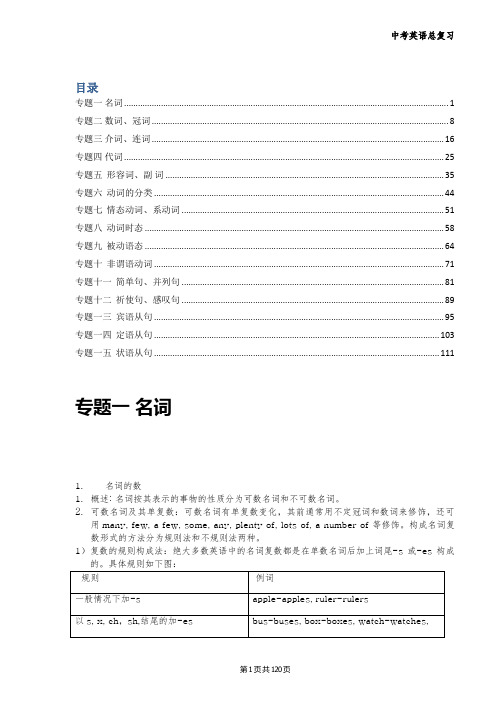
目录专题一名词 (1)专题二数词、冠词 (8)专题三介词、连词 (16)专题四代词 (25)专题五形容词、副词 (35)专题六动词的分类 (44)专题七情态动词、系动词 (51)专题八动词时态 (58)专题九被动语态 (64)专题十非谓语动词 (71)专题十一简单句、并列句 (81)专题十二祈使句、感叹句 (89)专题一三宾语从句 (95)专题一四定语从句 (103)专题一五状语从句 (111)专题一名词1.名词的数1.概述: 名词按其表示的事物的性质分为可数名词和不可数名词。
2.可数名词及其单复数:可数名词有单复数变化,其前通常用不定冠词和数词来修饰,还可用many, few, a few, some, any, plenty of, lots of, a number of 等修饰。
构成名词复数形式的方法分为规则法和不规则法两种。
1)复数的规则构成法:绝大多数英语中的名词复数都是在单数名词后加上词尾-s或-es构成的。
具体规则如下图:a.单复同形的:Chinese-Chinese, Japanese-Japanese, deer-deer, sheep-sheep, fish-fish(表示鱼的数量)b. 熟记下列词的复数变化:man-men, woman-women, policeman-policemen, foot-feet, tooth-teeth, mouse-mice, child-childrenc. 以man, woman做定语构成的复合名词,变复数时要全变:a man teacher-two men teachers; 其他情况一般只变主体名词而作定语的名词不变:a girl student-two girl students3. 不可数名词:不可数名词没有单复数。
如:water, meat, air等。
在表示数量时,通常用以下方法。
1)用some, much, a little, little, a lot of, lots of, plenty of 等表示多少。
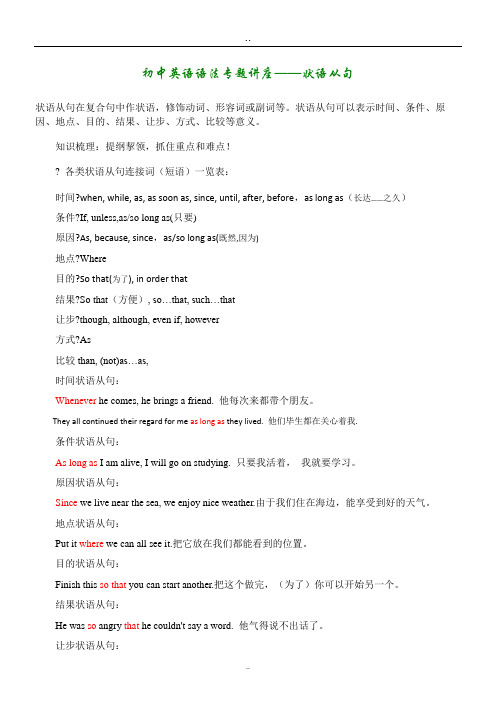
初中英语语法专题讲座——状语从句状语从句在复合句中作状语,修饰动词、形容词或副词等。
状语从句可以表示时间、条件、原因、地点、目的、结果、让步、方式、比较等意义。
知识梳理:提纲挈领,抓住重点和难点!? 各类状语从句连接词(短语)一览表:时间?when, while, as, as soon as, since, until, after, before,as long as(长达……之久)条件?If, unless,as/so long as(只要)原因?As, because, since,as/so long as(既然,因为)地点?Where目的?So that(为了), in order that结果?So that(方便), so…that, such…that让步?though, although, even if, however方式?As比较than, (not)as…as,时间状语从句:Whenever he comes, he brings a friend. 他每次来都带个朋友。
They all continued their regard for me as long as they lived. 他们毕生都在关心着我.条件状语从句:As long as I am alive, I will go on studying. 只要我活着,我就要学习。
原因状语从句:Since we live near the sea, we enjoy nice weather.由于我们住在海边,能享受到好的天气。
地点状语从句:Put it where we can all see it.把它放在我们都能看到的位置。
目的状语从句:Finish this so that you can start another.把这个做完,(为了)你可以开始另一个。
结果状语从句:He was so angry that he couldn't say a word. 他气得说不出话了。
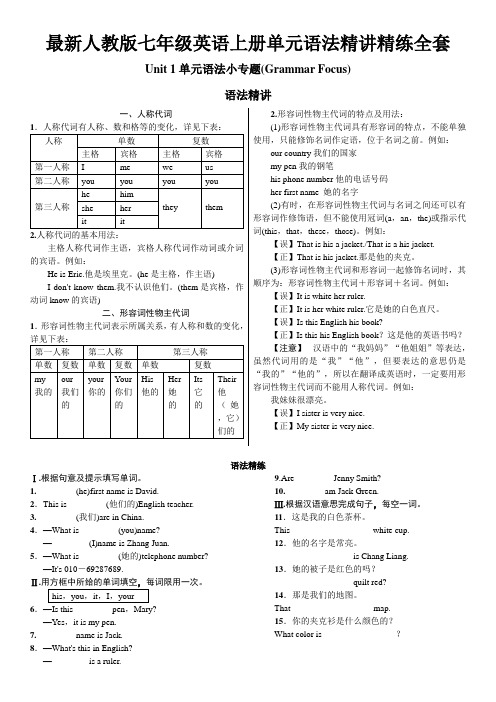
最新人教版七年级英语上册单元语法精讲精练全套Unit 1单元语法小专题(Grammar Focus)语法精讲一、人称代词主格人称代词作主语,宾格人称代词作动词或介词的宾语。
例如:He is Eric.他是埃里克。
(he 是主格,作主语)I don't know them.我不认识他们。
(them 是宾格,作动词know 的宾语)二、形容词性物主代词1.形容词性物主代词表示所属关系,有人称和数的变化,详见下表:2.形容词性物主代词的特点及用法:(1)形容词性物主代词具有形容词的特点,不能单独使用,只能修饰名词作定语,位于名词之前。
例如: our country 我们的国家 my pen 我的钢笔 his phone number 他的电话号码 her first name 她的名字 (2)有时,在形容词性物主代词与名词之间还可以有形容词作修饰语,但不能使用冠词(a ,an ,the)或指示代词(this ,that ,these ,those)。
例如: 【误】That is his a jacket./That is a his jacket. 【正】That is his jacket.那是他的夹克。
(3)形容词性物主代词和形容词一起修饰名词时,其顺序为:形容词性物主代词+形容词+名词。
例如:【误】It is white her ruler. 【正】It is her white ruler.它是她的白色直尺。
【误】Is this English his book? 【正】Is this his English book ?这是他的英语书吗? 【注意】 汉语中的“我妈妈”“他姐姐”等表达,虽然代词用的是“我”“他”,但要表达的意思仍是“我的”“他的”,所以在翻译成英语时,一定要用形容词性物主代词而不能用人称代词。
例如:我妹妹很漂亮。
【误】I sister is very nice.【正】My sister is very nice.语法精练Ⅰ.根据句意及提示填写单词。

初中英语语法专题讲座——状语从句状语从句在复合句中作状语,修饰动词、形容词或副词等。
状语从句可以表示时间、条件、原因、地点、目的、结果、让步、方式、比较等意义。
知识梳理:提纲挈领,抓住重点和难点!各类状语从句连接词(短语)一览表:时间when,while,as,assoon as,since,until,after,before,a slongas(长达……之久)条件 If,unless,as/so long as(只要)原因 As,because, since,as/so long as(既然,因为)地点 Where目的So that(为了),in order that结果 So that(方便), so…that,such…that让步 though, although, evenif,however方式As比较 than,(not)as…as,时间状语从句:Whenever he comes,hebrings a friend。
他每次来都带个朋友。
They allcontinuedtheir regardfor me as long as they lived.他们毕生都在关心着我。
条件状语从句:Aslong as I amalive, I will goon studying.只要我活着,我就要学习。
原因状语从句:Since we live nearthe sea,we enjoy nice weather.由于我们住在海边,能享受到好的天气.地点状语从句:Put it where we can all see it.把它放在我们都能看到的位置。
目的状语从句:Finish this sothat you canstartanother。
把这个做完,(为了)你可以开始另一个。
结果状语从句:Hewas soangry thathe couldn’t say aword。
他气得说不出话了。
让步状语从句:Though heis in poor health,he works hard。
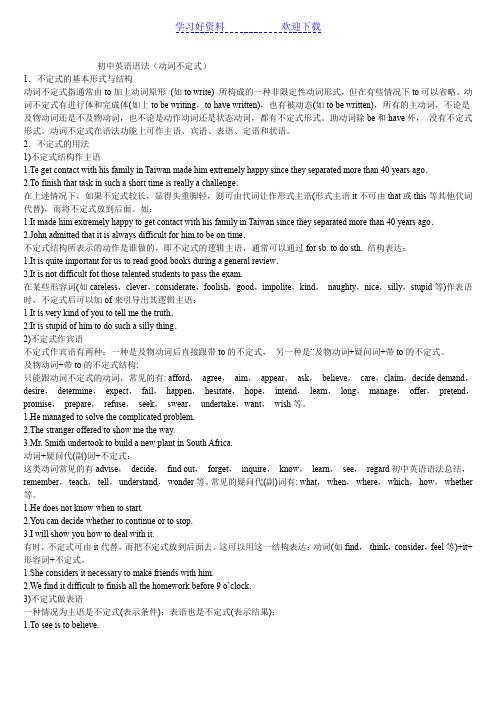
初中英语语法(动词不定式)1.不定式的基本形式与结构动词不定式指通常由to加上动词原形(如to write) 所构成的一种非限定性动词形式,但在有些情况下to可以省略。
动词不定式有进行体和完成体(如上to be writing,to have written),也有被动态(如to be written),所有的主动词,不论是及物动词还是不及物动词,也不论是动作动词还是状态动词,都有不定式形式。
助动词除be和have外,没有不定式形式。
动词不定式在语法功能上可作主语、宾语、表语、定语和状语。
2.不定式的用法1)不定式结构作主语1.Te get contact with his family in Taiwan made him extremely happy since they separated more than 40 years ago.2.To finish that task in such a short time is really a challenge.在上述情况下,如果不定式较长,显得头重脚轻,则可由代词让作形式主语(形式主语it不可由that或this等其他代词代替),而将不定式放到后面。
如:1.It made him extremely happy to get contact with his family in Taiwan since they separated more than 40 years ago.2.John admitted that it is always difficult for him to be on time.不定式结构所表示的动作是谁做的,即不定式的逻辑主语,通常可以通过for sb. to do sth. 结构表达:1.It is quite important for us to read good books during a general review.2.It is not difficult fot those talented students to pass the exam.在某些形容词(如careless,clever,considerate,foolish,good,impolite,kind,naughty,nice,silly,stupid等)作表语时,不定式后可以加of来引导出其逻辑主语:1.It is very kind of you to tell me the truth.2.It is stupid of him to do such a silly thing.2)不定式作宾语不定式作宾语有两种:一种是及物动词后直接跟带to的不定式,另一种是“及物动词+疑问词+带to的不定式。
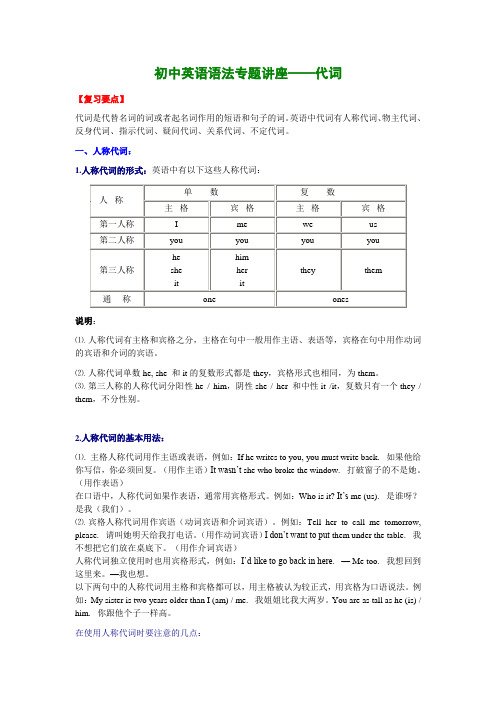
初中英语语法专题讲座——代词【复习要点】代词是代替名词的词或者起名词作用的短语和句子的词。
英语中代词有人称代词、物主代词、反身代词、指示代词、疑问代词、关系代词、不定代词。
一、人称代词:1.人称代词的形式:英语中有以下这些人称代词:说明:⑴. 人称代词有主格和宾格之分,主格在句中一般用作主语、表语等,宾格在句中用作动词的宾语和介词的宾语。
⑵. 人称代词单数he, she 和it的复数形式都是they,宾格形式也相同,为them。
⑶. 第三人称的人称代词分阳性he / him,阴性she / her 和中性it /it,复数只有一个they / them,不分性别。
2.人称代词的基本用法:⑴. 主格人称代词用作主语或表语,例如:If he writes to you, you must write back. 如果他给你写信,你必须回复。
(用作主语)It wasn’t she who broke the window. 打破窗子的不是她。
(用作表语)在口语中,人称代词如果作表语,通常用宾格形式。
例如:Who is it? It’s me (us). 是谁呀?是我(我们)。
⑵. 宾格人称代词用作宾语(动词宾语和介词宾语)。
例如:Tell her to call me tomorrow, please. 请叫她明天给我打电话。
(用作动词宾语)I don’t want to put them under the table. 我不想把它们放在桌底下。
(用作介词宾语)人称代词独立使用时也用宾格形式,例如:I’d like to go back in here.— Me too. 我想回到这里来。
—我也想。
以下两句中的人称代词用主格和宾格都可以,用主格被认为较正式,用宾格为口语说法。
例如:My sister is two years older than I (am) / me. 我姐姐比我大两岁。
You are as tall as he (is) / him. 你跟他个子一样高。
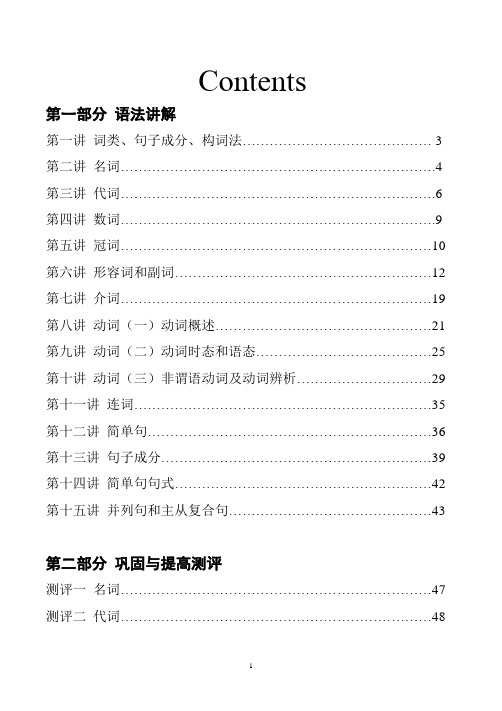
Contents第一部分语法讲解第一讲词类、句子成分、构词法 (3)第二讲名词 (4)第三讲代词 (6)第四讲数词 (9)第五讲冠词 (10)第六讲形容词和副词 (12)第七讲介词 (19)第八讲动词(一)动词概述 (21)第九讲动词(二)动词时态和语态 (25)第十讲动词(三)非谓语动词及动词辨析 (29)第十一讲连词 (35)第十二讲简单句 (36)第十三讲句子成分 (39)第十四讲简单句句式 (42)第十五讲并列句和主从复合句 (43)第二部分巩固与提高测评测评一名词 (47)测评二代词 (48)测评三数词 (51)测评四冠词 (52)测评五形容词和副词 (54)测评六介词 (58)测评七动词 (60)测评八连词 (69)测评九句子 (70)测评十交际用语 (75)第三部分语法网络图第一讲:词类、句子成分和构词法:1、名词(n.):表示人、事物、地点或抽象概念的名称。
如:boy, morning, bag, ball, class, orange.2、代词(pron.):主要用来代替名词。
如:who, she, you, it .3、形容词(adj..):表示人或事物的性质或特征。
如:good, right, white, orange .4、数词(num.):表示数目或事物的顺序。
如:one, two, three, first, second, third, fourth.5、动词(v.):表示动作或状态。
如:am, is,are,have,see .6、副词(adv.):修饰动词、形容词或其他副词,说明时间、地点、程度等。
如:now, very, here, often, quietly, slowly.7、冠词(art..):用在名词前,帮助说明名词。
如:a, an, the.8、介词(prep.):表示它后面的名词或代词与其他句子成分的关系。
如in, on, from, above, behind.9、连词(conj.):用来连接词、短语或句子。

中考英语语法重、难点精讲、练习及答案语法精讲:一般现在时一般现在时(The Simple Present Tense)是我们英语学习中接触到的第一个时态,也是初一英语最重要的语法内容之一。
一般现在时有三种形式1. 谓语是be(am/is/are)的一般现在时。
①肯定形式:主语+be+表语(形容词、名词充当表语)。
I am hungry.You are beautiful.He is a doctor.②否定形式:主语+be+not+表语(形容词、名词充当表语)。
I am not hungry.You aren’t beautiful.He isn’t a doctor.③一般疑问句形式:Be+主语+表语(形容词、名词充当表语)?肯定回答:Yes,主语+be. 否定回答:No, 主语+ be+not.—Are you hungry?—Yes,I am./No, I’m not.—Is he a doctor?—Yes, he is./No, he isn’t.④特殊疑问句形式:特殊疑问词+Be开头的一般疑问句?—What is he?—He is a doctor.注意:be要随着主语变。
2. 谓语动词是实义动词(及物动词或不及物动词)的一般现在时。
①肯定形式:“主语+及物动词+宾语”或“主语+不及物动词”。
She has a little brother.她有一个弟弟。
The sun rises in the east.太阳从东方升起。
②否定形式:“主语+don’t/doesn’t+及物动词+宾语”或“主语+don’t/doesn’t+不及物动词”。
She doesn’t have a little brother.她没有弟弟。
I don’t eat every morning.我每天早晨都不吃饭。
③一般疑问句形式:“Do/Does+主语+及物动词原形+宾语”或“Do/Does+主语+不及物动词原形”。
学习好资料欢迎下载育才助教中心内部资料初中英语专题训练题专题一:词汇部分(名词、数词、冠词)A:名词专项可修饰名词的常用词:1)修饰可数名词与不可数名词:some, any, a lot of, lots of, plenty of2)饰可数名词的有:many, (a)few, a large (great) number of3)只修饰不可数名词的有:much, (a)little, a great deal of2、难点1)名词所有格的归纳1、a student's room, students' rooms, father's shoes。
2、Children's Day3、a friend of my father's4、a twenty minutes' walk,ten miles' journey,a boat's length,two pounds' weight, ten dollars' worth。
(说明:表示时间、距离、长度、重量、价格、世界、国家等名词的所有格要用's)5、a map of China,the end of this term,the capital of our country, the color of the flowers。
(说明:无生命名词的所有格则必须用of结构)6、Li Lei and Wang Fei's bedroom, an hour and a half's talk(说明:表示两个名词共有一样东西时,在第二个名词后面加's)7、Jim's and Peter's desks; Joe's and David's books(说明:表示两个名词各有的东西时,在各个名词后都加's。
)2)名词词语辨析区别部分名词词语辨析:I.voice, noise, sound, musicII.home, house, family, countryIII.place , floor, room , groundIV.work, job3、易错点1)Help yourself to _________.A. some chickensB. a chickenC. some chickenD. any chicken答案: C (选择A的同学要注意chicken当鸡肉讲时不可数)2)________ it is today!A. What fine weatherB. What a fine weather学习好资料欢迎下载C. How a fine weather D. How fine a weather育才助教中心内部资料答案: A. (选择B的同学要注意weather不可数.选择C和D的同学要注意weather是名词,要用what 来感叹.)3)Which is the way to the __________?A. sh oe factoryB. shoes factoryC. shoe’s factoryD. shoes’ factory答案: A. (选择D的同学注意这里不是指名词所有格,而是名词作形容词的用法.类似的用法如: pencil box; school bag等.)4) This class ________ now. Miss Gao teaches them.A. are studyingB. is studyingC. be studyingD. studying答案: A. (选择B的同学要注意,当这种概念名词当“人”讲的时候要做复数处理. 类似的还有: the police are running after the thief等)第二部分:强化练习一、单项选择1、基础题1.---What would you like to drink, ________ or orange?---Orange, please.A. hamburgerB. chipC. cokeD. icecream2.--- They are thirsty. Will you please give them ______ ?--- Certainly.A. some bottles of watersB. some bottles of waterC. some bottle of waterD. some bottle of waters3.The ________are going to fly to Beijing.A.GermenB. GermanyC. GermanysD. Germans4.What’s yo ur _______ for being late again?A.ideaB. keyC. excuseD. news5.--- It’s dangerous here. We’d better go out quickly.--- But I think we should let _______ go out first.A. woman and childrenB. women and childC. woman and childD. women and children6.--- You can see Mr. Smith if there is a sign “_______ ”on the door of his shop.--- Thanks.A.ENTRANCEB.BUSINESS HOURSC.THIS SIDE UPD.NO SMOKING7.Are they going to have a picnic on _______ ?A. Children’s DayB. Childrens’s DayC. Childrens DayD. Children Day8.are cleaned every day.育才助教中心内部资料A. Our classroom of windowsB. Our classroom windowsC. Our classroom of windowsD. The windows of our classroom9.There is still orange here, but people want to drink it.A. little, littleB. a little, fewC. a little, a fewD. a few, little10.I have never read any books of .A. Luxun'sB. Mark TwainC. Charles DickensD. Bill Gates1、提高题1.Twelve were hurt, but no were lost in that accident.A. person, lifeB. people, livesC. peoples, livesD. persons, life2. One of the family on the bed.A. photos isB. photoes areC. photos areD. photoes is3.There are some foreigners talking in the room. They are two ,three and two .A. Japanese; Englishmen; GermansB. Japanese; Englishman, GermanC. Japaneses; Englishmen, GermansD. Japanese, Englishmen, Germen4.The sign “BUSINESS HOURS” can be seen in a.A. shopB. schoolC. parkD. museum5.m other made them have piano lessons.A. Peter and AnneB. Peter's and Anne'sC. Peter's and AnneD. Peter and Anne's6.-Please help me move the table in.-But there is not enough for it.A. placeB. floorC. roomD. ground7.These _________ have saved many children’s lives.A. woman doctorsB. women doctorC. women doctorsD. woman doctor8.Yesterday Xiao Min bought a new pair of .It is made of .A. glass; glassB. glasses; glassC. glasses; glassesD. glass; glasses9.-How does Mr Smith go to his office?-Every morning he takes a to his office.A.20 minutes walkB.20 minute's walkC.20 minute walkD.20 minutes' walk10. I went to the shop to buy a dictionary.A. bookB. booksC. book'sD. books'11.-Do you think selling vegetables ?-Yes, but my mother likes it very much.A. is a hard workB. are hard workC. is hard workD. is hard job12.You should take more _______. Don’t always sit at the desk busy doing your_______.育才助教中心内部资料A. exercise, exerciseB. exercises, exercisesC. exercises, exerciseD. exercise,exercises13.She was born in Wuhan,but Beijing has become her second_______ .A. homeB. familyC. houseD. country14._____ day we’re having today!A. What a fineB. How fineC. What fine aD. What fine15.What did the headmaster say about Jim’s ______?A. two-months holidayB. two months’ holidaysC. two-month holidayD. two month’s holiday16.一 Where is David?一Oh, he is reading___ under the tall tree in the garden.A.several papers B.several paper C.a piece of paper D.a paper17.一 The Internet is so convenient that we can get all ________we wanted.—That’s right. It is very helpful in our lives now.A.the information B.an informationC.the informations D.information18.--- What about Mr.Bla ck’s speech?--- Wonderful! There were ____ people there.A. a large number of B.much C.a great deal of D. lots二、综合填空Yesterday my mother went into a shop to buy some fruit and v1.She put her basket and her handbag down on a table and went to buy some apples. She was going to pay them when she found the handbag was gone! The basket was on the table, but the handbag was not. My mother was very surprised.Suddenly there was a lot of n 2 at the door of the shop, and two p 3 came in. They were holding a man and my m 4 bag. One of them asked my mother how m 5 money she had.B:数词专项第一部分:知识点分析一、基数词1)基数词读法:年,月,日,时刻的读法,如 2007 年六月十三日读作:June (the) thirteenth, two thousand and seven(主要体现在口语考试和听力题目中)2)表示一个具体数字时,hundred, thousand, million, billion一律不用复数;在表示一个不确定数字时则用复数。